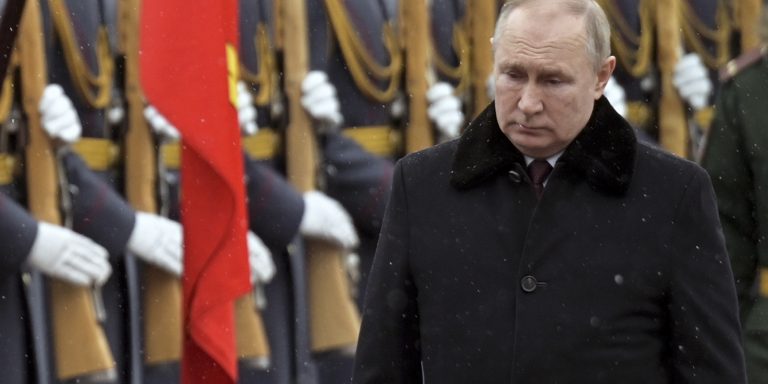INTELBRIEF
March 24, 2022
IntelBrief: How Will Russia’s Invasion of Ukraine Impact its Influence Abroad?

Bottom Line Up Front
- The poor performance of Russia’s military in Ukraine will have a negative impact on Moscow’s influence abroad, including in sub-Saharan Africa and the Middle East.
- Without a reputation for a strong military, Russian military deployments, already associated with a blatant disregard for human rights, will become less attractive.
- Russia’s performance could also lead to geopolitical tumult throughout its near abroad, with traditional Russian partners reconsidering what it means to be a vassal state and looking to alternative guarantors of security.
- Some Gulf countries are firmly in Russia’s camp, including Saudi Arabia and the UAE, with state media promoting pro-Russian narratives and focusing on the machismo of Putin while downplaying Moscow’s battlefield losses.
After four weeks of fighting in Ukraine, the Russian military is stalled and as a result, has resorted to indiscriminate shelling of civilian areas and the bombardment of infrastructure. Ukraine has fought with determination, despite the odds, and recent reports even suggest Ukrainian counteroffensives in some areas of southern Ukraine. Russia’s invasion of Ukraine was a conflict that, early on, many analysts believed would look similar to the Russian offensive in Georgia in August 2008, an operation that lasted approximately twelve days. Yet, the Russian military has performed poorly, plagued by shoddy logistics, low morale, and weak command-and-control. If Ukraine continues to inflict high losses on Russia’s military, with approximately 10,000 soldiers reportedly already killed in battle, it will have an immediate and tangible impact on Russia’s influence abroad. As it stands, Moscow has been isolated financially and ostracized by nation-states and multinational corporations throughout the world.
To respond to losses on the battlefield in Ukraine, Russia has called back manpower from the Middle East and Africa, with reports suggesting Wagner mercenaries were being relocated to assist with the fight in Ukraine. By drawing down resources in Syria, Moscow is ceding influence to Tehran, which is working to consolidate its own gains in the Levant as Syrian dictator Bashar al-Assad looks to be accepted once again by countries in the region. By drawing down assets in Africa, including Mali, Mozambique, Libya, and the Central African Republic (CAR), Russia will be seen as unreliable. Moscow’s involvement in African countries was already viewed as rapacious, a swap of security for access to precious gems, minerals, and other resources that was highly sought after because it came with no strings attached. Russia’s poor military performance will negatively impact its image abroad, making it less likely for nation-states to seek out Russian training and military-to-military relationships. Without a reputation for a strong military, Russian military deployments, already associated with a blatant disregard for human rights, will become less attractive.
Between losses of soldiers, vehicles, and equipment, Russia will likely be forced to scale down its overseas deployments, working instead to rebuild its military. There will need to be a wholesale assessment by the Russian government of what went wrong in Ukraine and how Moscow can repair the damage to its armed forces and its reputation. Russia’s performance could also lead to geopolitical tumult throughout its near abroad, with longstanding Russian partners and allies reconsidering what it means to be a vassal state and looking abroad to non-traditional guarantors of security. In Central Asia, this could mean China assuming a more direct role in regional security organizations, seizing the opportunity to pull countries closer to Beijing and away from Moscow’s orbit.
There are some regions of the world firmly in Russia’s camp. State-run media from countries in the Gulf, including Saudi Arabia and the United Arab Emirates, has been overwhelmingly pro-Russia, recycling many of the same narratives depicted in right-wing Western media that portrays Russian President Vladimir Putin as tough and masculine. Russia’s remaining allies are few, however, and growing fewer by the day. Only five countries voted against a United Nations resolution condemning Russian aggression for its invasion of Ukraine—North Korea, Syria, Eritrea, Russia itself, and Belarus. Putin has completely transformed Russia into a pariah state, with a reputation on par with Kim Jong Un’s North Korea, a country few want to be associated with given its vast human rights abuses and disregard for international law. China has mostly remained supportive of Russia, going to great lengths to avoid criticizing Putin and attempting to portray its motives as that of a peacemaker or mediator between Moscow and Kyiv. One of the unintended consequences of Putin’s ill-fated invasion could be to accelerate China’s rise while crystallizing a more subservient role for Russia in the countries’ partnership going forward, with Moscow increasingly dependent on Chinese assistance to provide an economic and diplomatic lifeline.